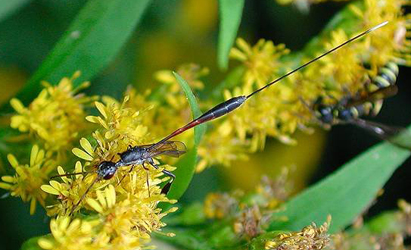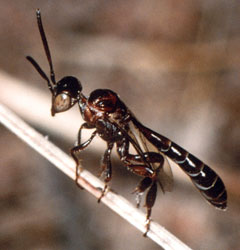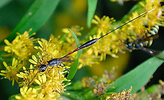Gasteruptiidae
John T. Jennings and Andrew R. Deans

This tree diagram shows the relationships between several groups of organisms.
The root of the current tree connects the organisms featured in this tree to their containing group and the rest of the Tree of Life. The basal branching point in the tree represents the ancestor of the other groups in the tree. This ancestor diversified over time into several descendent subgroups, which are represented as internal nodes and terminal taxa to the right.

You can click on the root to travel down the Tree of Life all the way to the root of all Life, and you can click on the names of descendent subgroups to travel up the Tree of Life all the way to individual species.
For more information on ToL tree formatting, please see Interpreting the Tree or Classification. To learn more about phylogenetic trees, please visit our Phylogenetic Biology pages.
close boxIntroduction
Gasteruptiidae is represented by perhaps 1500-2000 species worldwide (Jennings and Austin 2002), of which about 500 are described. It is divided into two subfamilies that are recognised as monophyletic (Jennings and Austin 2000): Gasteruptiinae and Hyptiogastrinae.
The larvae of Gasteruptiidae are reported to be predators or predator-inquilines of various solitary bees and wasps (e.g. H?ppner 1904; Malyshev 1966; Carlson 1979, Jennings and Austin 2004). Various authors have used the term secondary cleptoparasitoid (synonymous with predator-inquiline) (see Valentine and Walker 1991) or ectoparasitoid (synonymous with predator) (see Prinsloo 1985) when referring to gasteruptiids.
Characteristics
Gasteruptiidae is one on the most easily recognised families of parasitic wasps. They are particularly distinctive because of their slender, subclavate metasoma (see title illustrations), the dorsal articulation of the metasoma to the propodeum (see the Evanioidea page), the elongate, neck-like propleura, and expanded hind tibia.
Discussion of Phylogenetic Relationships
In a recent phylogenetic analysis by Jennings & Austin (2000), Gasteruptiinae (Gasteruption) was shown to be a monophyletic group and the sister to Hyptiogastrinae. Jennings & Austin (2002) examined internal relationships within Hyptiogastrinae and recognised just two genera; Hyptiogaster Kieffer which includes all taxa with an exserted ovipositor, and its sister genus Pseudofoenus Kieffer, representing all remaining Hyptiogastrinae (i.e. those with a short and hidden ovipositor).
References
Carlson, R. W. 1979. Superfamily Evanioidea. pp. 1109-1118. In Krombein, K. V., Hurd, P. D., Smith, D. R., and Burks, B. D. (Eds.), Catalog of Hymenoptera in America North of Mexico. Vol. 1. Symphyta and Apocrita (Parasitica). (Smithsonian Institution Press: Washington, DC).
H?ppner, H. 1904. Zur biologie der Rubus-bewohner. Allegemeine Zeitschrift fur Entomologie 5/6, 97-103.
Jennings, J. T. and Austin, A. D., 2004. Biology and host relationships of aulacid and gasteruptiid wasps (Hymenoptera: Evanioidea): a review. pp. 187-215. In Rajmohana, K., Sudheer, K., Girish Kumar, P., & Santhosh, S. (Eds.) Perspectives on Biosystematics and Biodiversity. University of Calicut, Kerala, India.
Jennings, J. T. and A. D. Austin. 2002. Systematics and distribution of world hyptiogastrine wasps (Hymenoptera: Gasteruptiidae). Invertebrate Systematics 16: 735-811.
Jennings, J. T. and Austin, A. D. 2000. Higher-level phylogeny of the Aulacidae and Gasteruptiidae (Hymenoptera: Evanioidea). pp. 154-164. In Austin, A. D. & M. Dowton (Eds) The Hymenoptera: Evolution, Biodiversity and Biological Control. CSIRO Publishing, Melbourne.
Malyshev, S. I. 1966. Genesis of the Hymenoptera and the Phases of Their Evolution. (Transl.) (Methuen & Co.: London).
Prinsloo, G. L. 1985. Order Hymenoptera (sawflies, wasps, bees, ants). Suborder Apocrita. Section Parasitica. pp. 404-406. In Scholtz, C. H., and Holm, E. (Eds.), Insects of Southern Africa (Butterworths: Durban).
Valentine, E. W. and Walker, A. K. 1991. Annotated catalogue of New Zealand Hymenoptera. DSIR Plant Protection Report No. 4.
Title Illustrations
| Scientific Name | Gasteruption jaculator |
|---|---|
| Specimen Condition | Live Specimen |
| Sex | Female |
| Life Cycle Stage | adult |
| Copyright | © 2004 Hania Arentsen and Hans Arentsen |
| Scientific Name | Pseudofoenus spinitarsis (Westwood) |
|---|---|
| Location | Australia |
| Comments | Scale bar = 1 mm |
| Creator | G. Weber, photographer |
| Specimen Condition | Live Specimen |
| Identified By | John Jennings |
| Sex | Female |
| Life Cycle Stage | adult |
| Body Part | habitus |
| Copyright | © 2004 John T. Jennings |
About This Page
John T. Jennings
Waite Insect & Nematode Collection,
School of Earth & Environmental Sciences,
Waite Campus,
University of Adelaide,
Glen Osmond SA 5064,
AUSTRALIA
Andrew R. Deans
School of Computational Science
Florida State University
Tallahassee, FL 32306
U.S.A.
Correspondence regarding this page should be directed to John T. Jennings at and Andrew R. Deans at
Page copyright © 2004 John T. Jennings and Andrew R. Deans
- First online 06 May 2005
Citing this page:
Jennings, John T. and Deans, Andrew R. 2005. Gasteruptiidae. Version 06 May 2005 (under construction). http://tolweb.org/Gasteruptiidae/23535/2005.05.06 in The Tree of Life Web Project, http://tolweb.org/









